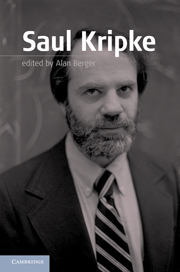Book contents
- Frontmatter
- Contents
- List of Contributors
- Introduction to Kripke
- Part I Naming, Necessity, and Apriority
- 1 Kripke on Proper and General Names
- 2 Fiction, Myth, and Reality
- 3 Kripke on Epistemic and Metaphysical Possibility
- 4 Possible Worlds Semantics
- Part II Formal Semantics, Truth, Philosophy of Mathematics, and Philosophy of Logic
- Part III Language and Mind
- Part IV Philosophy of Mind and Philosophical Psychology
- Index
- References
4 - Possible Worlds Semantics
Philosophical Foundations
Published online by Cambridge University Press: 05 June 2012
- Frontmatter
- Contents
- List of Contributors
- Introduction to Kripke
- Part I Naming, Necessity, and Apriority
- 1 Kripke on Proper and General Names
- 2 Fiction, Myth, and Reality
- 3 Kripke on Epistemic and Metaphysical Possibility
- 4 Possible Worlds Semantics
- Part II Formal Semantics, Truth, Philosophy of Mathematics, and Philosophy of Logic
- Part III Language and Mind
- Part IV Philosophy of Mind and Philosophical Psychology
- Index
- References
Summary
Introduction
Saul Kripke did more than anyone else to bring possible worlds into the contemporary philosophical discourse, first with his more formal work on the model theory for modal logic in the 1960s, and then with his more philosophical lectures on reference and modality, delivered in January 1970, that used the possible worlds apparatus informally to clarify the relations between semantic issues about names and metaphysical issues about individuals and kinds. Possible worlds semantics have been widely applied since then, both in philosophy and in other fields such as linguistic semantics and pragmatics, theoretical computer science, and game theory. Kripke’s work, along with that of David Lewis, stimulated an ongoing debate about the nature and metaphysical status of possible worlds. Kripke himself has had little to say about the issues raised in this debate, in print, beyond what he said in Naming and Necessity and in brief remarks in a preface to a later edition of the lectures, published in 1980. But there is a clear view of the nature of possible worlds, and of the status of an explanation of modality in terms of possible worlds, implicit in the lectures and the preface.
Keywords
Information
- Type
- Chapter
- Information
- Saul Kripke , pp. 100 - 116Publisher: Cambridge University PressPrint publication year: 2011
References
Accessibility standard: Unknown
Why this information is here
This section outlines the accessibility features of this content - including support for screen readers, full keyboard navigation and high-contrast display options. This may not be relevant for you.Accessibility Information
- 3
- Cited by
